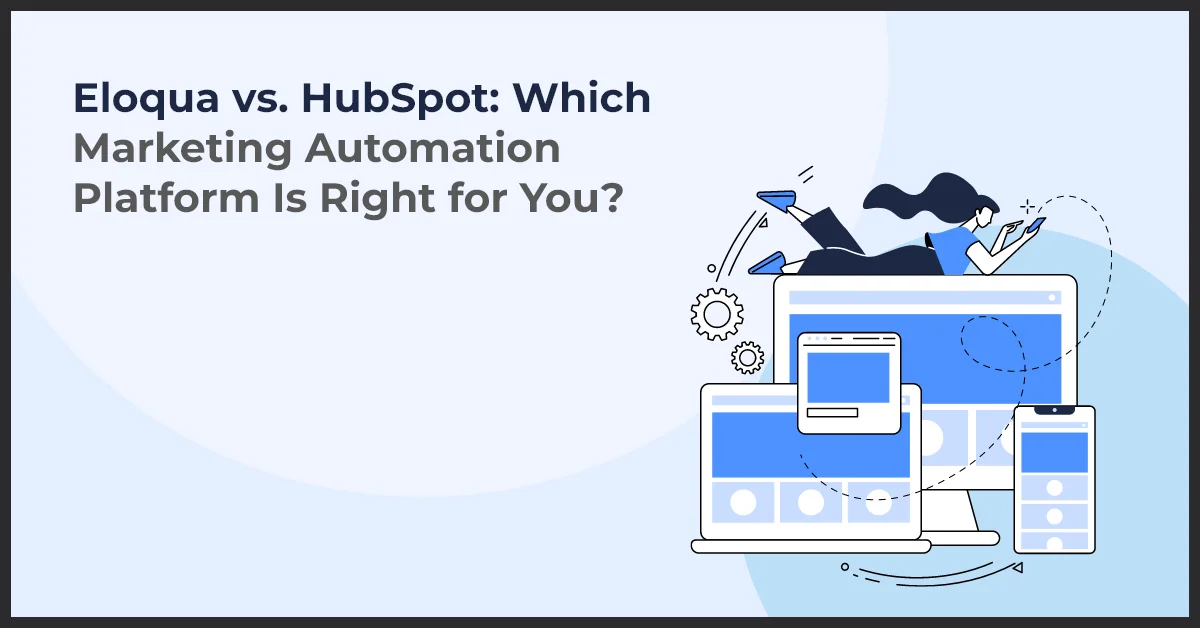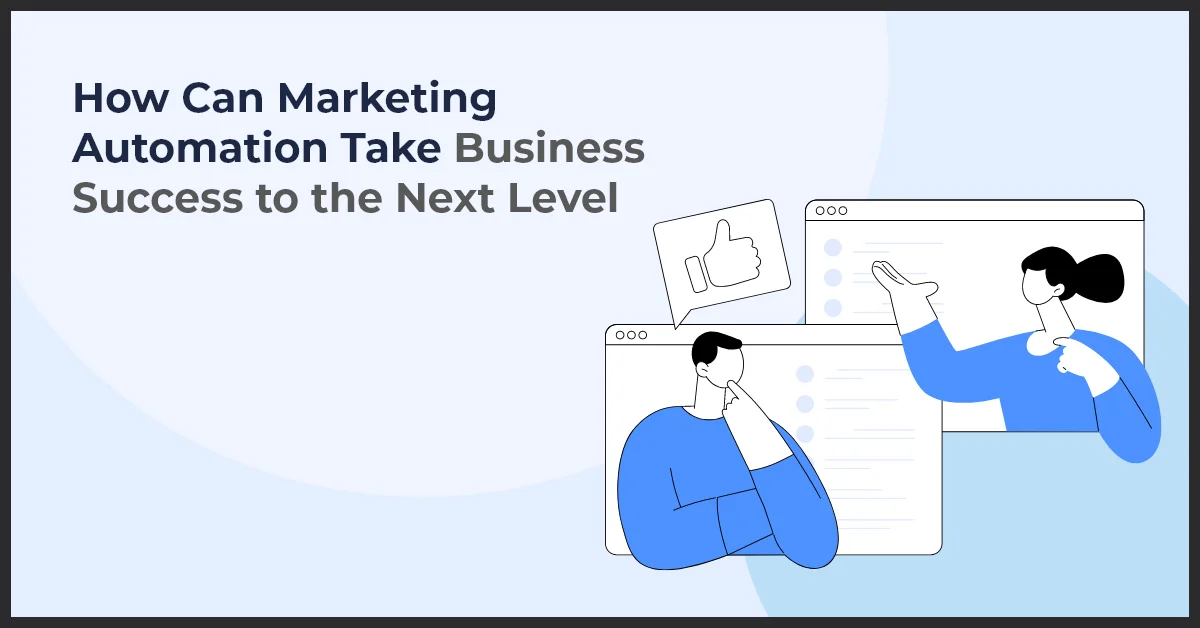Marketing Automation Platform Comparison: Finding the Right Fit for Your Business

Published on: December 22, 2023
Updated on: December 27, 2024
2821 Views
- Marketing Automation
10 min read
In the ever-evolving landscape of digital marketing, where efficiency and precision are paramount, the adoption of marketing automation platforms has become a game-changer for businesses seeking to streamline their processes and enhance their marketing efforts. As the demand for automation solutions continues to rise, the challenge lies in choosing the right marketing automation platform that aligns with the unique needs and goals of a business. In this comprehensive guide, we will delve into a marketing automation platform comparison, exploring key features, strengths, and considerations to help you make an informed decision.
Understanding the Basics of Marketing Automation Platforms
Marketing automation platforms are robust tools designed to automate repetitive marketing tasks, streamline workflows, and facilitate personalized communication with leads and customers. These platforms are equipped with a range of features, including email marketing, lead nurturing, campaign management, analytics, and integration capabilities. The overarching goal is to optimize marketing processes, increase efficiency, and ultimately drive better results for businesses.
Key Considerations in Marketing Automation Platform Comparison
1. Ease of Use and Implementation:
Consider the user-friendliness of the platform and the ease of implementation. A platform that is intuitive and offers a smooth onboarding process can save time and resources, ensuring that your team can quickly adapt to and leverage the features of the automation tool.
2. Scalability:
Evaluate the scalability of the platform to ensure it can grow alongside your business. A scalable solution accommodates the evolving needs of your marketing strategy, allowing for the addition of new features, users, and integrations as your business expands.
3. Integration Capabilities:
An effective marketing automation platform seamlessly integrates with other tools and systems, such as Customer Relationship Management (CRM) software, analytics tools, and content management systems. Integration ensures a unified approach to data management and allows for a holistic view of customer interactions.
4. Features and Functionality:
Compare the features and functionality offered by different platforms. Assess whether the platform aligns with your specific marketing goals, such as lead generation, lead nurturing or customer retention. Look for advanced features like dynamic content, A/B testing, and advanced analytics to enhance your marketing capabilities.
5. Customization Options:
Consider the level of customization the platform provides. The ability to tailor campaigns, workflows, and reports to match your business's unique requirements is crucial for maximizing the platform's effectiveness in addressing your specific marketing challenges.
6. Cost and ROI:
Evaluate the overall cost of the platform, including subscription fees, implementation costs, and any additional charges. Compare the cost against the expected return on investment (ROI) to ensure that the chosen platform delivers tangible value for your marketing budget.
Pro Tip: When comparing marketing automation platforms, prioritize solutions that offer ease of use and scalability. This will allow your team to adapt quickly and ensure the platform grows alongside your business without frequent changes. Additionally, focus on integration capabilities to create a unified marketing ecosystem, allowing seamless data flow across tools like CRM and analytics platforms.
Marketing Automation Platform Comparison: Popular Choices
1. HubSpot:
HubSpot is a widely acclaimed marketing automation platform known for its user-friendly interface and comprehensive set of features. It offers tools for lead management, email marketing, social media promotion, and analytics. HubSpot's all-in-one approach is particularly beneficial for small to medium-sized businesses seeking an integrated solution.
2. Marketo:
Marketo, now part of Adobe, is a robust marketing automation platform designed for enterprise-level businesses. It provides advanced features for lead scoring, account-based marketing, and revenue attribution. Marketo's strength lies in its scalability and ability to handle complex marketing workflows.
3. Pardot:
Pardot, a Salesforce product, is a B2B marketing automation platform. It offers features such as lead nurturing, email marketing, and ROI reporting. Pardot is known for its seamless integration with Salesforce CRM, making it an ideal choice for businesses heavily invested in the Salesforce ecosystem.
4. ActiveCampaign:
ActiveCampaign is a versatile marketing automation platform suitable for businesses of all sizes. It combines automation with customer experience automation (CXA) and provides features like email marketing, automation workflows, and CRM. ActiveCampaign's emphasis on customer experience sets it apart, making it a favorite for businesses prioritizing customer relationships.
5. Eloqua:
Oracle Eloqua is an enterprise-level marketing automation platform with a focus on data-driven marketing. It offers advanced analytics, lead scoring, and personalized content creation. Eloqua's integration with Oracle's broader suite of business applications makes it a strategic choice for large enterprises.
Pro Tip: When selecting a marketing automation platform, consider the features and how well the platform aligns with your business goals. For instance, HubSpot's all-in-one approach is excellent for small businesses, while Marketo or Eloqua may better suit larger enterprises needing advanced functionalities. Additionally, consider the level of customer support and training offered, as this can significantly impact your team's successful adoption of the platform.
Making an Informed Decision
1. Assess Your Business Needs:
Before diving into a marketing automation platform comparison, conduct an internal assessment of your business needs and goals. Identify specific pain points in your current marketing processes that automation can address.
2. Define Key Features:
Clearly define the key features and functionalities you require in a marketing automation platform. Prioritize features based on their relevance to your marketing strategy and goals.
3. Trial Periods and Demos:
Take advantage of trial periods and platform demonstrations offered by vendors. This hands-on experience allows you to assess the platform's usability and compatibility with your team's workflow.
4. Gather Feedback:
Engage with your marketing and sales teams to gather their input on the platform's usability and effectiveness. Their insights can provide valuable perspectives on how well the platform aligns with day-to-day operations.
5. Consider Long-Term Goals:
Choose a platform that aligns not only with your current needs but also with your long-term marketing goals. A platform that can grow with your business ensures a sustainable investment.
Marketing Automation Platform Comparison: Platform A vs. Platform B vs. Platform C
In today's competitive digital landscape, businesses are increasingly relying on marketing automation platforms to streamline their marketing efforts and drive growth. With numerous options available, it is essential to compare and evaluate different platforms to find the best fit for your business. In this section, we will compare the features, pricing, and user experiences of Platform A, Platform B, and Platform C.
A. Features Comparison
When comparing marketing automation platforms, it is crucial to consider their key features and functionalities.
Here is a breakdown of the features offered by Platform A, Platform B, and Platform C:
- Automation capabilities: Evaluate the automation capabilities of each platform, such as workflow automation, lead nurturing, and behavior-based triggers.
- Integration with other marketing tools: Consider how well each platform integrates with other marketing tools and software, such as CRM systems, social media platforms, and email marketing software.
- Lead generation and customer segmentation tools: Analyze the lead generation and customer segmentation capabilities of each platform, including lead scoring, data enrichment, and personalized content delivery.
- Campaign management and personalization features: Assess the campaign management and personalization features offered by each platform, such as A/B testing, dynamic content, and multi-channel campaign management.
- Email marketing functionalities: Compare the email marketing functionalities of each platform, including email templates, automation sequences, and deliverability rates.
- Reporting and analytics capabilities: Examine the reporting and analytics capabilities of each platform, such as real-time data, advanced analytics, and customizable dashboards.
- User interface and user experience (UI/UX): Consider the ease of use and intuitiveness of the user interface and user experience provided by each platform.
- Pricing and cost-effectiveness: Evaluate the pricing structure and cost-effectiveness of each platform based on your specific marketing needs and budget.
- Scalability and flexibility: Determine whether each platform can scale along with your business and adapt to your evolving marketing requirements.
- Training and customer support: Consider the level of training and customer support offered by each platform, including documentation, online resources, and dedicated support channels.
- Data privacy and security measures: Examine the data privacy and security measures implemented by each platform to ensure the safety of your sensitive information.
Pro Tip: Prioritize marketing automation platforms that align with your goals, offer strong automation and lead scoring, and provide a user-friendly interface. Also, ensure scalability to support your business growth and evolving needs.
B. Case Studies and User Feedback
When making a marketing automation platform comparison, it is important to consider real-life success stories and user feedback.
Here are some aspects to consider:
- Success stories and positive experiences with each platform: Explore case studies and success stories of businesses that have achieved impressive results using Platform A, Platform B, or Platform C.
- User reviews and feedback from businesses similar to ours: Search for user reviews and feedback from businesses in your industry or with similar marketing goals to gain insights into their experiences with each platform.
C. Pricing Comparison
Pricing is a crucial aspect of any marketing automation platform comparison. Take a detailed look at the pricing plans of Platform A, Platform B, and Platform C, and evaluate their cost-effectiveness based on your business needs.
- Detailed breakdown of pricing plans: Analyze the pricing structure, including monthly or annual subscriptions, different tiers of service, and add-on options.
- Evaluation of the cost-effectiveness of each platform: Compare the price of each platform against its features and benefits to determine which offers the best value for your investment.
By thoroughly comparing the features, user experiences, and pricing of Platform A, Platform B, and Platform C, you will be able to make an informed decision and select the marketing automation platform that best suits your business needs.
Key Takeaways
- Marketing automation platforms streamline marketing processes by automating repetitive tasks and enhancing personalized communication with customers and leads.
- Key considerations for selecting a marketing automation platform include ease of use, scalability integration capabilities, features and functionality, and customization options.
- Popular marketing automation platforms such as HubSpot Marketo and ActiveCampaign offer distinct strengths catering to different business needs and sizes.
- Conducting an internal assessment of your business needs and utilizing trial periods or demos can help you decide when choosing a marketing automation platform.
- Comparing features, user experiences, and pricing of various platforms ensures that you select a solution that aligns with your marketing strategy and long-term goals.
Conclusion
After conducting a thorough marketing automation platform comparison, we have gained valuable insights into the strengths and weaknesses of Platform A, Platform B, and Platform C.
Here is a recap of the key findings:
- Platform A offers a user-friendly interface and robust reporting capabilities, making it a great choice for small businesses looking to streamline their marketing efforts.
- Platform B excels in its advanced segmentation and personalization features, making it an ideal option for larger businesses with complex customer journeys.
- Platform C stands out for its comprehensive lead management and CRM integration capabilities, making it a top choice for sales-focused organizations.
Based on the specific needs and goals of our business, we recommend choosing Platform B as our marketing automation solution.
However, we understand that every business is unique, and it is essential to make an informed decision. We encourage you to take advantage of trial periods or demos offered by these platforms before making a final commitment. This will allow you to evaluate their features and functionalities firsthand.
Frequently Asked Questions
Marketing automation streamlines repetitive tasks, nurtures leads, and enhances customer engagement through personalized communication, freeing up time for strategic planning and analysis, ultimately boosting efficiency and ROI.
Businesses can determine the right platform by conducting thorough research, evaluating their specific requirements and goals, requesting demos or trials, seeking recommendations from industry peers, and considering factors such as user reviews and case studies.
Tips include setting clear goals and objectives, providing comprehensive training for users, gradually transitioning workflows, seeking input from stakeholders, regularly reviewing and optimizing processes, and leveraging customer support resources from the platform provider.
Yes, many marketing automation platforms offer customization options, such as creating custom fields, workflows, and reporting dashboards, to tailor the platform to the unique needs of each business.



